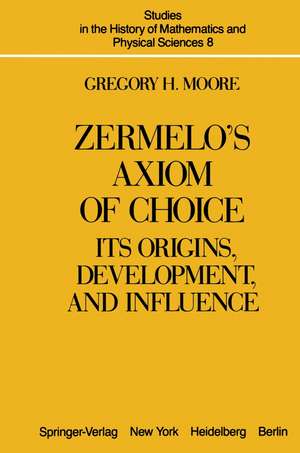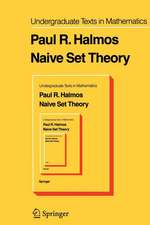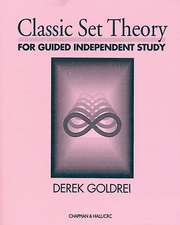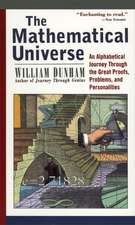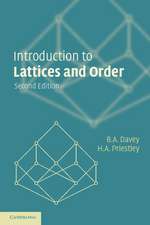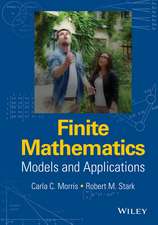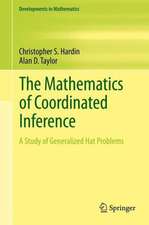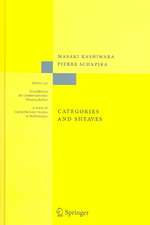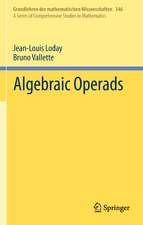Zermelo’s Axiom of Choice: Its Origins, Development, and Influence: Studies in the History of Mathematics and Physical Sciences, cartea 8
Autor G.H. Mooreen Limba Engleză Paperback – dec 2011
Preț: 394.51 lei
Nou
Puncte Express: 592
Preț estimativ în valută:
75.50€ • 81.98$ • 63.42£
75.50€ • 81.98$ • 63.42£
Carte tipărită la comandă
Livrare economică 23 aprilie-07 mai
Preluare comenzi: 021 569.72.76
Specificații
ISBN-13: 9781461394808
ISBN-10: 1461394805
Pagini: 428
Ilustrații: XIV, 412 p.
Dimensiuni: 152 x 229 x 22 mm
Greutate: 0.57 kg
Ediția:Softcover reprint of the original 1st ed. 1982
Editura: Springer
Colecția Springer
Seria Studies in the History of Mathematics and Physical Sciences
Locul publicării:New York, NY, United States
ISBN-10: 1461394805
Pagini: 428
Ilustrații: XIV, 412 p.
Dimensiuni: 152 x 229 x 22 mm
Greutate: 0.57 kg
Ediția:Softcover reprint of the original 1st ed. 1982
Editura: Springer
Colecția Springer
Seria Studies in the History of Mathematics and Physical Sciences
Locul publicării:New York, NY, United States
Public țintă
ResearchCuprins
Prologue.- 1 The Prehistory of the Axiom of Choice.- 1.1 Introduction.- 1.2 The Origins of the Assumption.- 1.3 The Boundary between the Finite and the Infinite.- 1.4 Cantor’s Legacy of Implicit Uses.- 1.5 The Well-Ordering Problem and the Continuum Hypothesis.- 1.6 The Reception of the Well-Ordering Problem.- 1.7 Implicit Uses by Future Critics.- 1.8 Italian Objections to Arbitrary Choices.- 1.9 Retrospect and Prospect.- 2 Zermelo and His Critics (1904–1908).- 2.1 König’s “Refutation” of the Continuum Hypothesis.- 2.2 Zermelo’s Proof of the Well-Ordering Theorem.- 2.3 French Constructivist Reaction.- 2.4 A Matter of Definitions: Richard, Poincaré, and Fréchet.- 2.5 The German Cantorians.- 2.6 Father and Son: Julius and Denes König.- 2.7 An English Debate.- 2.8 Peano: Logic vs. Zermelo’s Axiom.- 2.9 Brouwer: A Voice in the Wilderness.- 2.10 Enthusiasm and Mistrust in America.- 2.11 Retrospect and Prospect.- 3 Zermelo’s Axiom and Axiomatization in Transition (1908–1918).- 3.1 Zermelo’s Reply to His Critics.- 3.2 Zermelo’s Axiomatization of Set Theory.- 3.3 The Ambivalent Response to the Axiomatization.- 3.4 The Trichotomy of Cardinals and Other Equivalents.- 3.5 Steinitz and Algebraic Applications.- 3.6 A Smoldering Controversy.- 3.7 Hausdorff’s Paradox.- 3.8 An Abortive Attempt to Prove the Axiom of Choice.- 3.9 Retrospect and Prospect.- 4 The Warsaw School, Widening Applications, Models of Set Theory (1918–1940).- 4.1 A Survey by Sierpi?ski.- 4.2 Finite, Infinite, and Mediate.- 4.3 Cardinal Equivalents.- 4.4 Zorn’s Lemma and Related Principles.- 4.5 Widening Applications in Algebra.- 4.6 Convergence and Compactness in General Topology.- 4.7 Negations and Alternatives.- 4.8 The Axiom’s Contribution to Logic.- 4.9 ShiftingAxiomatizations for Set Theory.- 4.10 Consistency and Independence of the Axiom.- 4.11 Scepticism and Inquiry.- 4.12 Retrospect and Prospect.- Epilogue: After Gödel.- 5.1 A Period of Stability: 1940–1963.- 5.2 Cohen’s Legacy.- Conclusion.- Appendix 1 Five Letters on Set Theory.- Appendix 2 Deductive Relations Concerning the Axiom of Choice.- Journal Abbreviations Used in the Bibliography.- Index of Numbered Propositions.- General Index.
